I recently found myself searching for an organic crib mattress. I thought the process would be simple but quickly discovered that there are many choices, all boasting different claims.
Some crib mattresses say they’re “made with organic materials,” while others are labeled “nontoxic,” “environmentally friendly,” “green,” or “natural.” Then there’s the confusing matter of certification, with some labels sporting GreenGuard Gold, GOTS, GOLS, or CertiPUR-US awards.
If you’re as confused as I was, you’ll want to read on. We’ve dug deep to learn more about crib mattress standards and organic mattress certifications. We’ll explain it all below in simple terminology.
We’ll also share our top picks for organic crib mattresses based on certification, safety features, cost, size, and weight. Here’s how to find the best organic crib mattress for your baby.
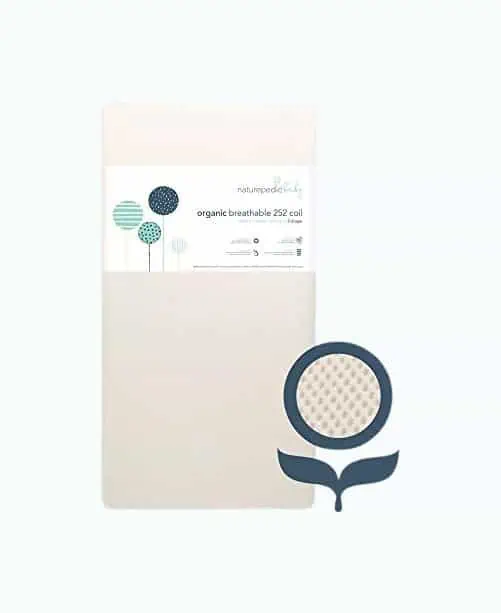
- Breathable
- Waterproof coating
- Limited lifetime warranty
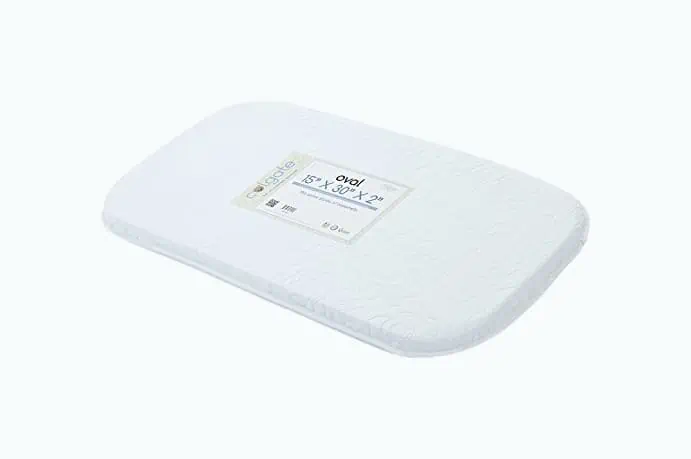
- GreenGuard Gold certified
- Durability proven and tested
- Easy to clean
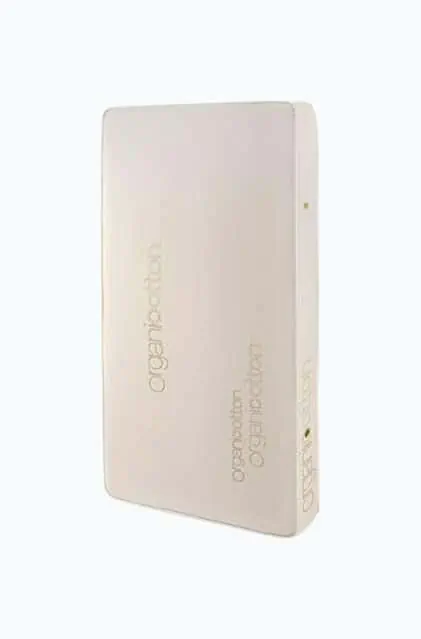
- CertiPUR-US certified
- Blended organic cotton cover
- Waterproof
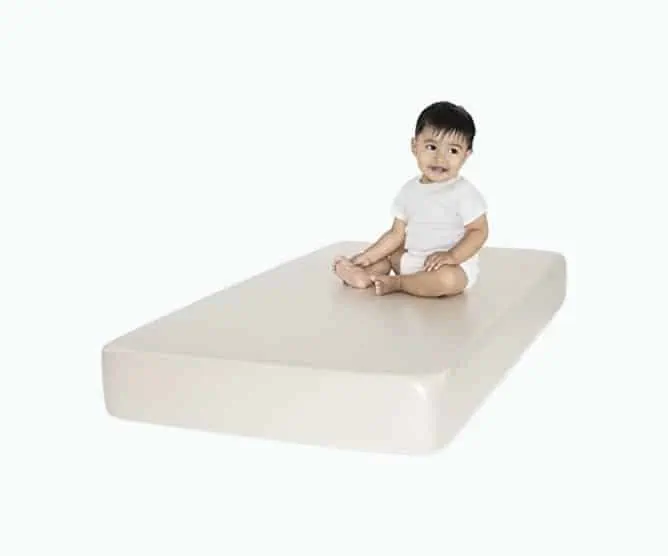
- CertiPUR-US & GreenGuard certified
- Blended organic cotton cover
- Extremely lightweight
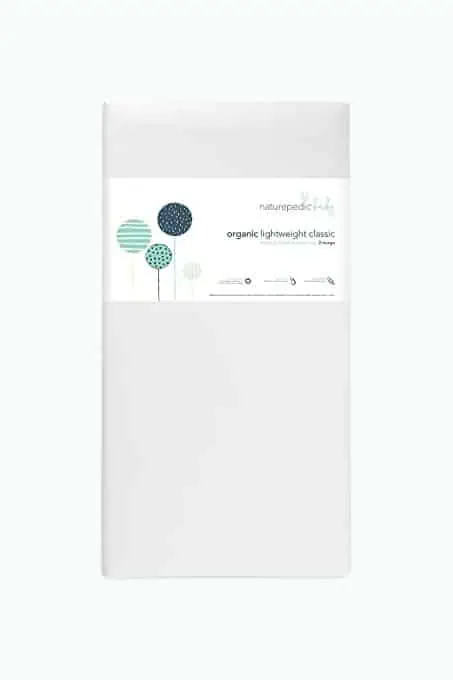
- GOTS and GreenGuard certified
- Can be used with a toddler bed
- Hypoallergenic
Review Methodology: At Mom Loves Best, we understand the importance of a safe and healthy sleep environment for your little one. Our hands-on analysis and thorough research of the best organic crib mattresses evaluate products from a user’s perspective, combining our professional experience with data-driven comparisons. We meticulously assess factors such as materials, safety, comfort, and durability, while providing quantitative measurements of each product’s performance. Our criteria for evaluation include identifying key decision-making factors and ranking each mattress based on those areas. By examining design choices, sharing first-hand evidence, and highlighting what sets each product apart from its competitors, we aim to instill trust and confidence in our recommendations for the ideal organic crib mattress for your baby.
The Best Organic Crib Mattresses of 2024
Here are 5 great organic crib mattresses for you to consider.
Naturepedic Organic Coil Crib Mattress
Best Organic Coil Mattress
This coil mattress has many of the certifications we discussed above to assure buyers of its high-quality material. The mattress has a 252 coil count and is padded with GOTS-certified 3D fabric for ultimate comfort.
Rather than using chemicals for protection, this mattress has an organic cotton cover that is not only breathable, allowing 360-degree air circulation, but also waterproof for easy cleanup of messes.
When it comes to chemicals, the mattress is GreenGuard Gold certified. This means it is held to stringent chemical emissions limits. The mattress also comes with a limited lifetime manufacturer’s warranty for defects, which always gives peace of mind.
At just over 22 pounds, though, this is one of the heavier mattresses out there. If you haven’t been lifting weights recently, changing the mattress could be a two-person job.
Pros
- GOTS and GreenGuard Gold certified.
- Breathable and waterproof.
- Firm mattress.
- Limited lifetime warranty.
Cons
- Changing sheets can be a chore with this 22-pound mattress.
Our Ratings
User Experience
Colgate Bassinet or Cradle Mattress
Best Organic Bassinet Mattress
Bassinets are used in the earliest days, but this is also the time when children are most sensitive. The Colgate bassinet mattress is a great option if you’re looking to go organic from the beginning but don’t want to use a traditional crib just yet.
This mattress is made with a GreenGuard-Gold-certified nontoxic material. A waterproof core helps protect it from long-term liquid damage — perfect for those newborn diaper blowouts or when you need to set your baby down after bathtime.
Designed to last, this bassinet mattress is tested for safety and durability and meets government safety standards. The mattress also meets the GreenGuard Gold standard for chemical emissions.
At 11.2 pounds, this is not a lightweight option compared to others on the list, but it certainly will fit most bassinets and cradles. Many bassinets are oval-shaped, but some aren’t, so take care that yours is the right size and shape before purchasing.
Pros
- Tested and proven to be durable.
- GreenGuard Gold certified.
- Waterproof.
- Easy to clean.
Cons
- It only fits oval-shaped sleep spaces.
Our Ratings
Personal Perspective
LA Baby Foam Organic Crib Mattress
Best Affordable Organic Crib Mattress
This soy foam mattress is CertiPUR-US certified for its low chemical emission levels. Soy foam is also high-density, ensuring this mattress provides the support new babies need. Because foam is usually petroleum-based, this soy alternative helps reduce your carbon footprint.
One side also includes a memory foam layer. This is for toddlers who are strong enough to control their bodies and can safely sleep on a softer mattress at night.
The mattress is wrapped with a blended organic cotton cover. “Blended organic” means it doesn’t quite fit the higher percentage standards of GOTS, but it does contain some organic raw material. This cover is waterproof and hypoallergenic for babies with sensitive skin.
At 13 pounds, it’s lighter than many on the market. It’s also designed with air vents to promote durability and a longer lifespan.
Pros
- Lighter than other organic mattresses at only 13 pounds.
- CertiPUR-US certified.
- Blended organic cotton cover.
- Waterproof outer layer.
Cons
- Not fully organic.
Our Ratings
Community Feedback
Colgate Eco-Classica Organic Crib Mattress
Best Organic Foam Crib Mattress
This mattress is CertiPUR-US certified, ensuring that the foam material is made with fewer chemicals. It’s also compliant with the GreenGuard standard, which means it meets more stringent VOC requirements.
The mattress is covered with certified organic cotton, containing a percentage of organic raw material. On the back side of this cotton cover is a waterproof layer to protect the mattress from accidents.
At 6 inches thick, you’ll get a tight fit for sheets, reducing the potential for suffocation hazards in your child’s crib. And at just over 9 pounds, this mattress is extremely lightweight.
Like others we have reviewed, this mattress is two-sided. As your child grows, you can flip it over for more comfort.
Pros
- CertiPUR-US certified.
- GreenGuard certified.
- Blended organic cotton cover.
- Easy to clean.
- Weighs only 9 pounds, making it easy to move around.
Cons
- Not fully organic.
- The infant side is firmer than many other mattresses.
Our Ratings
First-Hand Impression
Naturepedic Organic Crib Mattress
Best Organic Cotton Crib Mattress
This mattress is made with GOTS-certified organic cotton and doesn’t contain polyurethane foam. The mattress is also GreenGuard certified and contains no phthalates, vinyl, latex, perfluorinated compounds, formaldehyde, or flame retardants.
It’s covered with food-grade polyethylene waterproofing that isn’t derived from GMO plants. This keeps liquids and biological irritants, like mites, out of your mattress and away from your child. It can also be beneficial for babies who are sensitive to allergens, such as dust and pollen.
The size of this mattress contributes to its durability. It will fit most toddler beds. If taken care of, this mattress can last from the newborn days through the toddler bed years.
Pros
- GOTS and GreenGuard certified.
- Waterproof.
- It can be used with a toddler bed.
- Materials are good for kids with allergies.
Cons
- Doesn’t hold its shape for very long.
Our Ratings
User Experience
Natural vs. Organic: What’s the Difference?
Thanks to the work of journalists and environmental groups, we now understand that many modern products are made with a host of harmful chemicals. From pesticides to fire retardants, chemicals are introduced into products at every stage of the manufacturing process. Baby products, like crib mattresses, are no exception.
Unfortunately, for many of these chemicals, we don’t understand exactly how they impact human health. We do know that once products are in the home, these chemicals can “off-gas” and affect indoor air quality. Poor air quality can, at the very least, lead to eye, nose, and throat discomfort for your child (1).
Several brands have started offering “natural” or “organic” products in response to these revelations. These allegedly contain fewer harsh chemicals, such as heavy metals, pesticides, or phthalates.
In reality, though, the “natural” label means almost nothing. The Food and Drug Administration (FDA) has a policy on using the word “natural” with food products. However, it doesn’t apply to textile products like mattresses.
In essence, companies are free to use the term to attract buyers. The products behind the label don’t actually have to contain fewer chemicals or be more eco-friendly. So, the next time you see the word, it may be a good idea to dig deeper!
Items under an “organic” label are a different story, although still a complicated one. As of this writing, there isn’t a 100% organic certification available for mattresses. The United States Department of Agriculture (USDA) allows non-food brands to use the term organic, even when only a portion of the materials are certified organic.
However, there are a variety of helpful eco-friendly and organic certifications that can tell you more about your mattress. They inform you of some of the following criteria:
- The percentage of organic materials in the product.
- The types of chemicals not used in the product.
- The sustainability of the supply chain.
- The labor practices for the workers that manufactured it.
We use these certifications to ensure the crib mattresses we recommend are the most organic the market can offer.
How to Choose an Organic Crib Mattress
When it comes to crib mattresses, there are so many options. For many families, eco-friendly and organic materials are a top priority. However, other factors should be considered to ensure a safe sleeping environment for your child.
Organic and Environmental Certifications: What Do They Mean?
When it comes to crib mattresses, six different certifications may apply. Some apply to chemical levels in the mattress, while others indicate how the material was farmed and produced. Mattresses can have more than one of these certifications, or none of them.

























